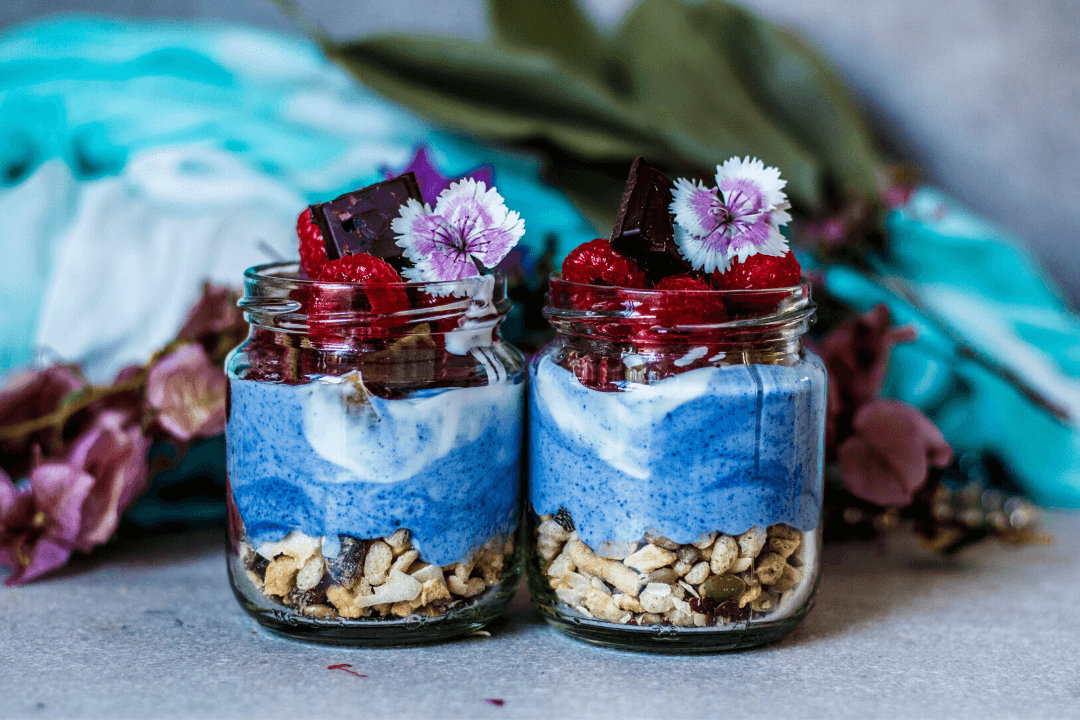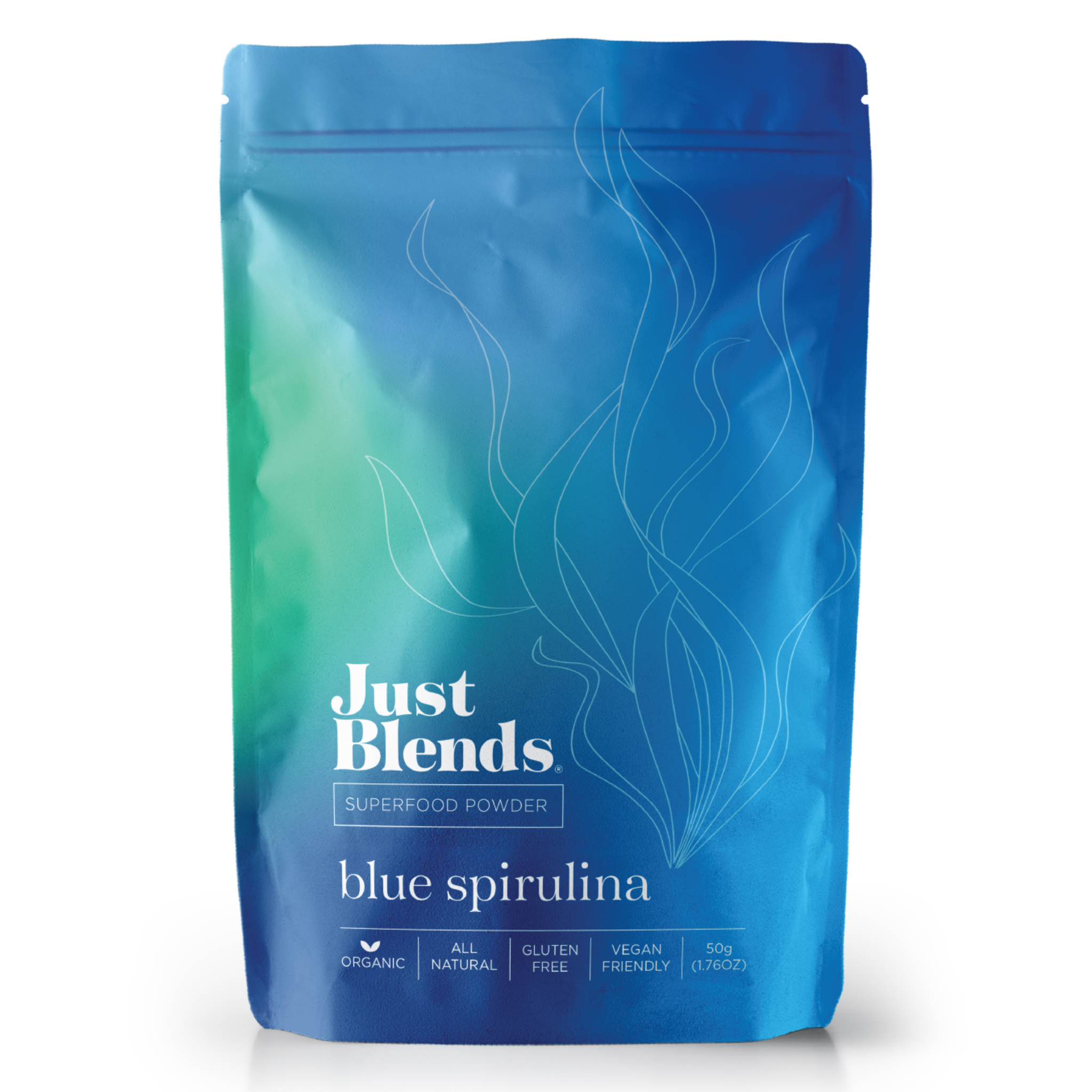So you've seen the Instagram photos of vibrant blue smoothies, you've heard the chatter on the wellness sites talking about this blue powerhouse powder... but just what are the health benefits of this blue-green algae?
Blue Spirulina (also known as PHYCOCYANIN) is a natural product purified from Spirulina, a blue-green algae.
WHAT IS SPIRULINA?
Spirulina is a natural ‘algae’ found in ponds and bodies of water when it is harvested correctly it is one of the most potent nutrient sources on the planet. It is believed to have been used by the Aztecs1 in the 16th century but its food source dates back even further to ninth century Chad.
It is incredibly high in protein and a fantastic source of antioxidants and boasts Vitamins B1, B2, B3, B6, and B9 as well as Vitamin C, Vitamin A, Vitamin D, and E. On top of that it has a large range of other nutrients. The United Nations has identified spirulina as a primary ingredient in the fight against malnutrition worldwide.2
Vegetarians love it due to its high concentration of protein and natural iron content, in turn, this makes it equally valuable after surgery, or anytime the immune system needs that extra boost.
Aside from the nutrition, spirulina also offers numerous environmental advantages as it requires ten times less water than other vegetables, harvests occur year-round and it can withstand extreme temperature.
__________________________________________________________________________
1 |
The most nutrient-dense food on the planet |
Spirulina undoubtedly takes center stage here, this tiny alga is packed with nutrients. A single tablespoon (7 grams) of dried Spirulina powder contains3:
Protein: 4 grams. It is considered a complete source of high-quality protein and is often compared to eggs for the amount of protein per gram. It gives all the essential amino acids that you need.
Vitamin B1: (Thiamine) 11% of the RDA (recommended daily allowance) This vitamin is necessary for the digestion of fats and proteins. It is often taken for increased energy, eye health, brain function, and for improving nerve functioning.
Vitamin B2: (Riboflavin) 15% of the RDA
Vitamin B3: (Niacin) 4% of the RDA Vitamin B6: (Pyridoxine) & Vitamin B9: (Folic acid)
Cooper: 21% of the RDA
Iron: 11% of the RDA, it has a highly absorbable form of iron that is gentle on the digestive system.
Calcium: Spirulina is also incredibly high in calcium with over 26 times the calcium in milk.
It also contains decent amounts of potassium, magnesium, zinc, and manganese and small amounts of almost every other nutrient that you need.
Important Note: It is often claimed that Spirulina is a good source of Vitamin B12. While it does contain a form of B12, it is pseudo-vitamin B12 which is not absorbable or effective in humans.
__________________________________________________________________________
2 |
POWERFUL ANTI-OXIDANT & ANTI-INFLAMMATORY PROPERTIES |
Spirulina’s main active component is called phycocyanin. This pigment does more than give Spirulina its unique blue-green colour. Phycocyanin is an antioxidant substance that can fight free radicals and inhibit the production of inflammatory signaling molecules. Spirulina has 280% more antioxidant potency than blueberries.
__________________________________________________________________________
3 |
LOWERS BLOOD PRESSURE |
Scientists have discovered that the pigment found in Spirulina (called Phycocyanin) possesses antihypertensive effects. One particular peptide, called SP6, has been identified as being primarily accountable for the lowering results in a study in Italy.
SP6 is believed to stimulate a process within the body that releases nitric oxide, a signaling molecule that helps your blood vessels relax and dilate. This effect was documented in one study4 , where participants benefited from added 4.5 grams of spirulina to their diets daily for six 6 weeks5.
__________________________________________________________________________
4 |
REGULATES BLOOD SUGAR LEVELS |
A small study6 group of type 2 diabetics tested the effect of spirulina on their blood glucose levels. With only adding 2 grams of spirulina daily to their diet, for a period of 2 months, reported lower blood glucose levels were reported.
A 1% drop in the key marker for long-term glucose regulation was also seen which could potentially reduce diabetes-related deaths by over 20%.
__________________________________________________________________________
5 |
HELPS BURN FAT & LOSE WEIGHT WHILST BUILDING MUSCLE STRENGTH & ENDURANCE |
Due to being a great source of protein spirulina is usually heralded as a weight loss supplement. The high protein can help in two ways; curbing your appetite and stimulating fat burning.
By increasing ‘thermogenesis’ within the body, spirulina promotes a greater need for fats (lipids) to be burnt as energy whilst that high protein keeps your hunger at bay. Research also suggests that spirulina can boost isometric muscle strength and endurance due to the essential amino acid content and high protein content important for muscle growth. Spirulina provides a nitric oxide boost which may improve overall athletic performance but also provides an excellent source of iron, which is necessary for energy production and oxygen transport in your muscles.
__________________________________________________________________________
6 |
HELPS REMOVE HEAVY METALS |
Spirulina can bind with heavy metals in the body and help remove them. We spoke earlier about phycocyanin (the pigment that gives spirulina its unique blue-green colour) well this is also a nitrogen storage molecule.
The good news with that is nitrogen atoms bind with heavy metals, hence aiding in the elimination of heavy metals from your body.
__________________________________________________________________________
7 |
REDUCES CHOLESTEROL |
Studies have shown that a daily dose of Spirulina may have the ability to normalise the blood lipids levels, in turn reducing cholesterol.
Spirulina’s vitamin E, beta-carotene, fatty acid, and especially niacin (vitamin B3) all help the metabolism of fats and plays a vital role in keeping your cholesterol down.
__________________________________________________________________________
8 |
COMBATS CANIDA & ENCOURAGES A HEALTHY GUT MICROBIOME |
A diet rich in sugar and processed ingredients has led to a significant rise in yeast infections. Spirulina has been shown to promote the growth of healthy bacterial flora in the intestines. This prevents candida from thriving but equally impressive is Spirulina's immune-strengthening properties which help the body to eliminate candida cells.7
This is particularly important is you suffer from an autoimmune disease such as Lupus, Fibromyalgia, CFS, or Crohn's disease, as chronic Candida yeast can worsen your symptoms.
__________________________________________________________________________
9 |
REDUCES SYMPTOMS OF RHINITIS, ASTHMA & ALLERGIES |
Spirulina suppresses the creation of Th2 cells, this is part of the immune system that can contribute to inflammation. In doing this, Spirulina decreases the inflammatory response and relaxes the airways, providing relief for rhinitis, asthma, or allergies.
One researcher of a double-blind, placebo-controlled study wrote8, “Spirulina is clinically effective on allergic rhinitis when compared with placebo.”
__________________________________________________________________________

CAUTIONS ON SPIRULINA |
Spirulina is a safe source of protein, nutrients, minerals, and vitamins with a long recorded history of use, it is entirely natural and generally considered a healthy food, however, there are some important things for everyone to consider.
Please seek medical advice / avoid spirulina if you are:
-
Pregnant
- Severely allergic to seafood
-
Allergic to iodine
- Nursing
__________________________________________________________________________
HOW MUCH SPIRULINA SHOULD I HAVE A DAY? |
With such tiny amounts of spirulina delivering us so much nutritional value, how much is enough to be having on a daily basis?
The recommended amount would be 1 teaspoon (approx 2g) per day. Using Just Blends Organic Blue Spirulina powder is as easy as adding it to your smoothie or baked goods.
You get the benefit of feeding your eyes as well as your body, the blue is so vibrant it can make the dullest of foods come alive! With our powder you don't get the fishy taste most people moan about either - our powders are neutral in taste so the only thing you get is the benefits!
Disclaimer: The techniques, strategies, and suggestions expressed here are intended to be used for educational purposes only. Just Blends are not rendering medical advice, nor to diagnose, prescribe, or treat any disease, condition, illness, or injury. It is imperative that before beginning any nutrition or exercise program you receive full medical clearance from your doctor.





